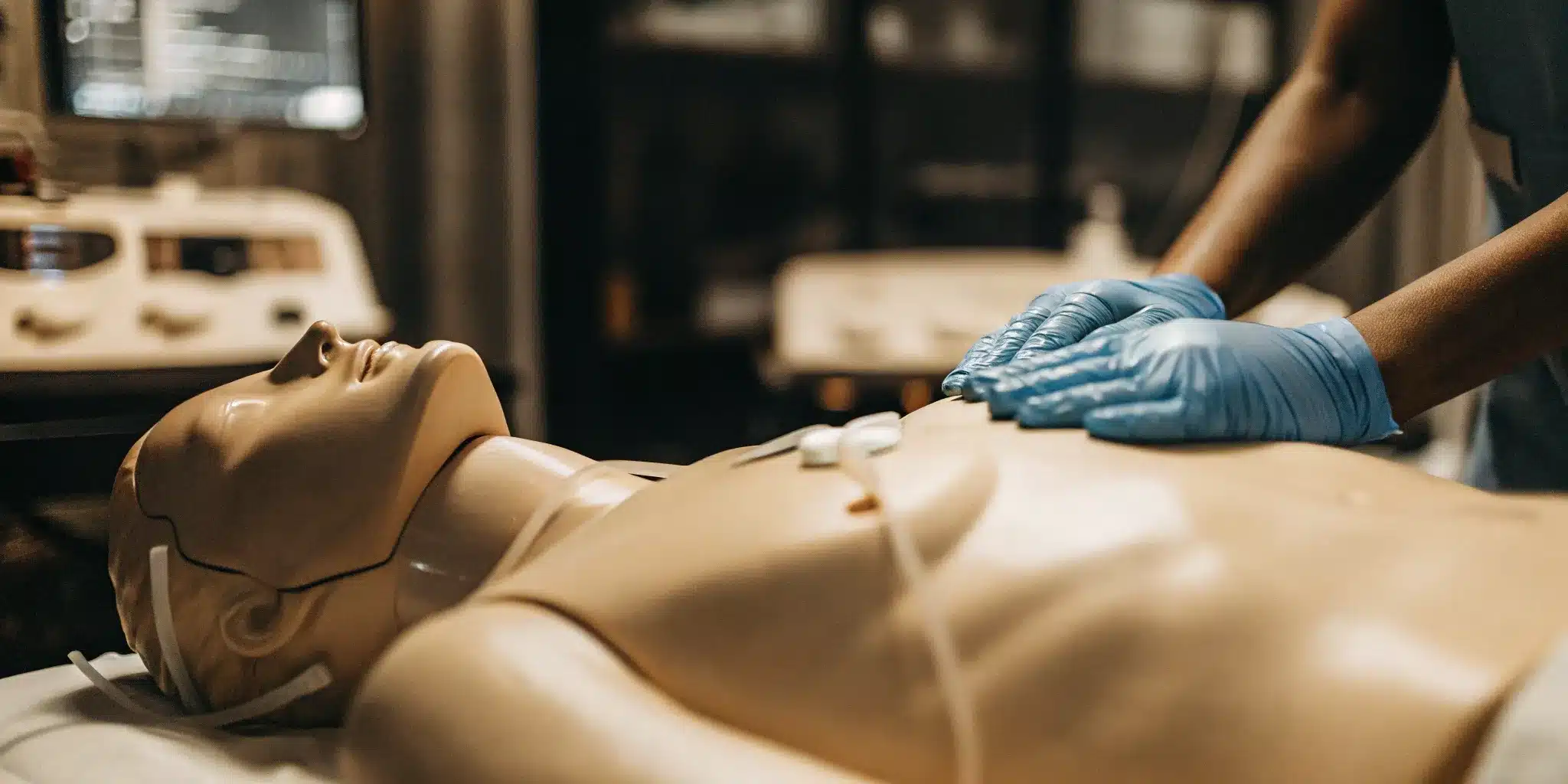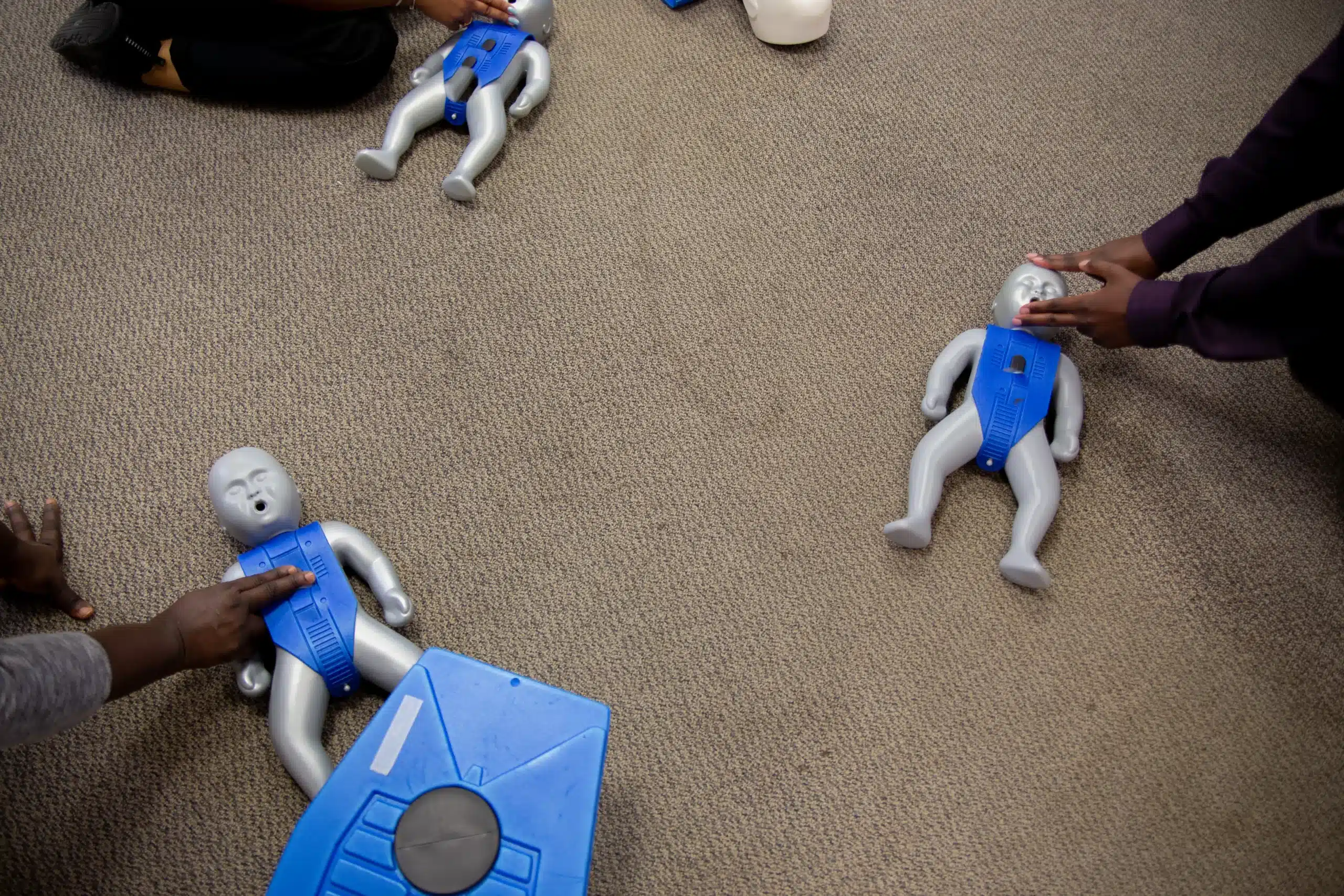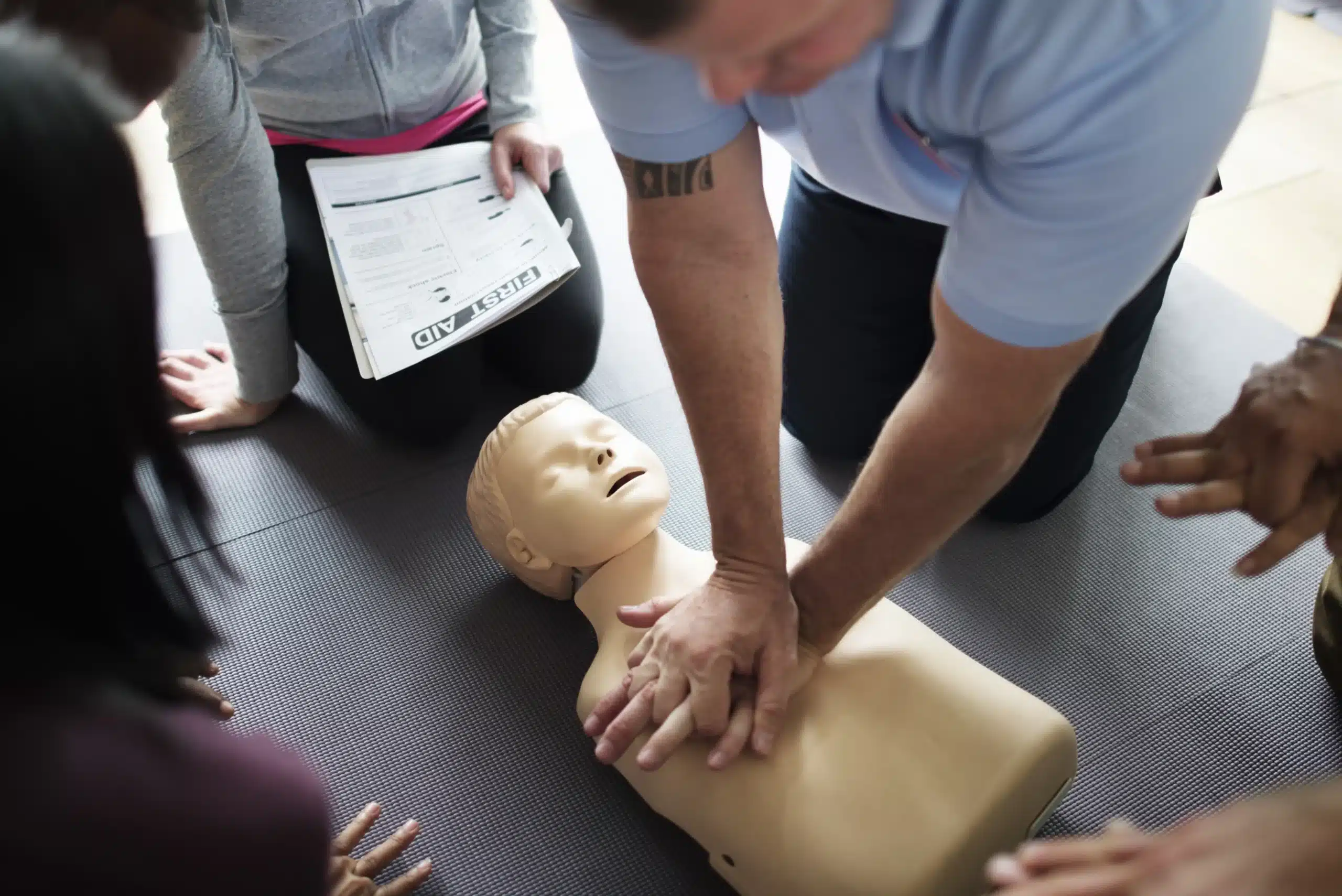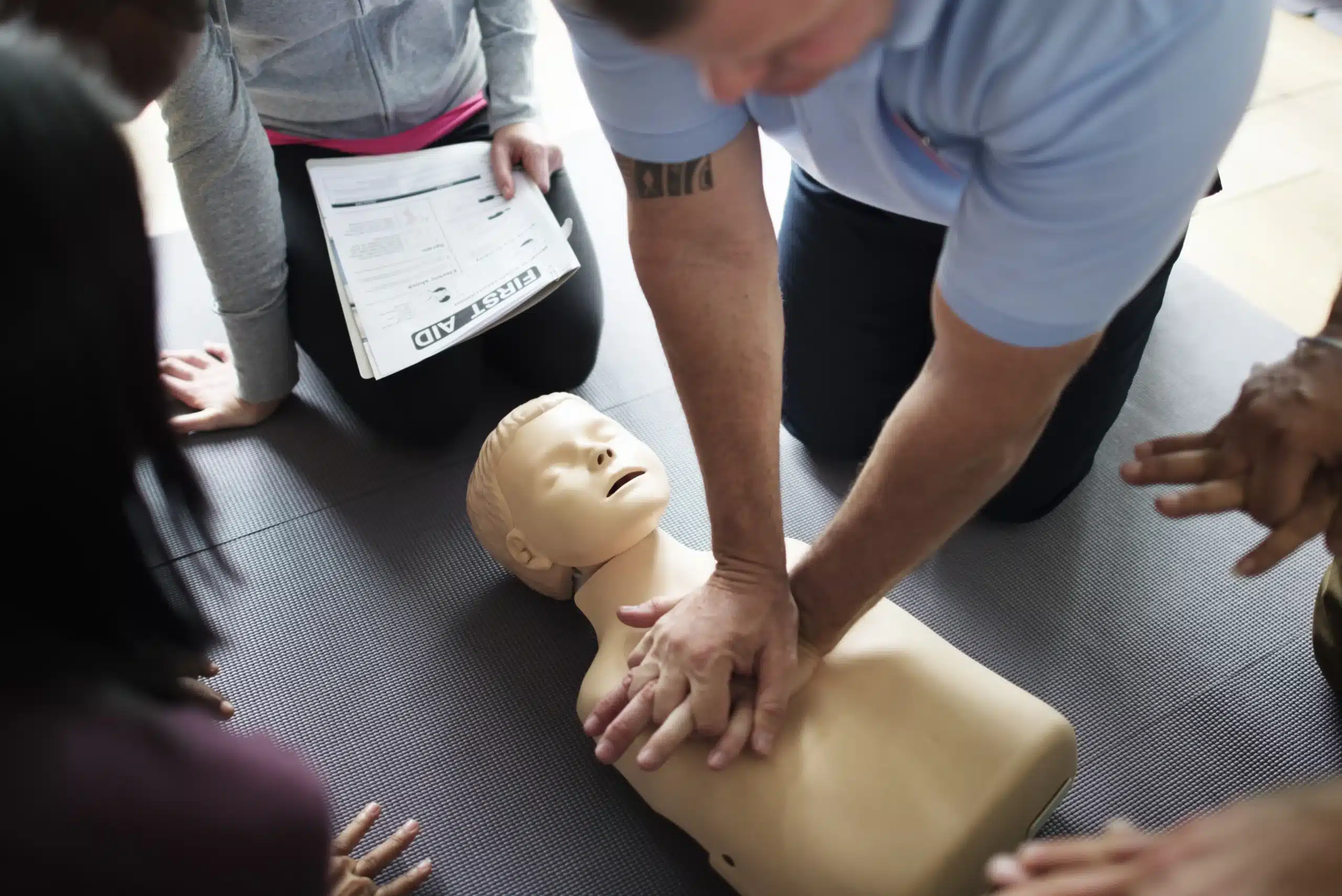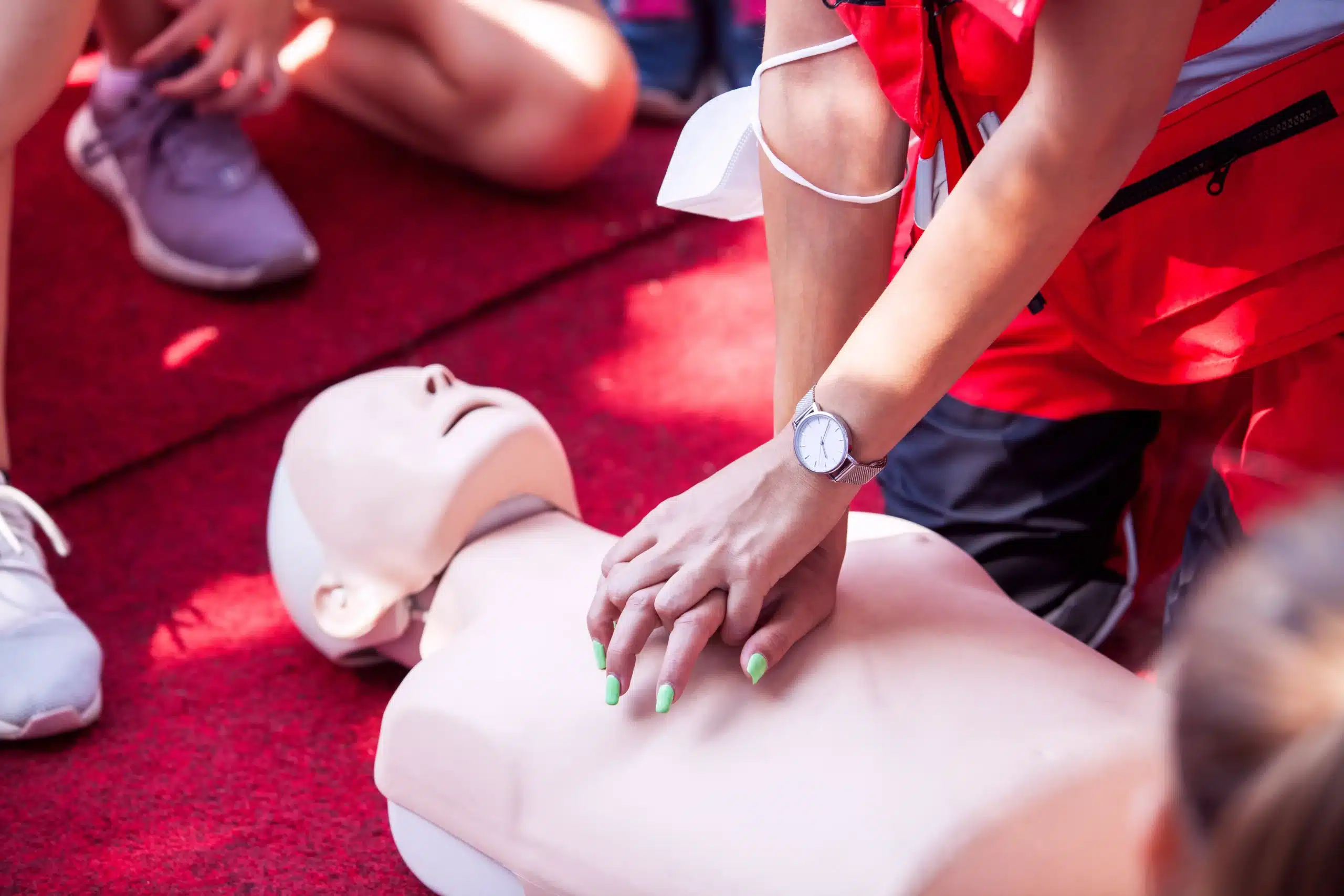Working in healthcare in Menlo Park means being prepared for anything. When it comes to life-threatening cardiac events, Advanced Cardiac Life Support (ACLS) certification is your toolkit for confident and effective intervention. But where do you start your search for advanced cardiac life support in Menlo Park? This guide breaks down the essentials of ACLS certification, from understanding the core protocols and techniques to finding the right training program in Menlo Park that fits your schedule and learning style. We’ll cover the key skills you’ll master, the typical course content, and how to maintain your certification. Plus, we’ll explore the costs associated with ACLS training and offer tips for overcoming common challenges during the course.
Key Takeaways
- ACLS is crucial for healthcare providers: It provides advanced life-saving skills for managing complex cardiac emergencies, leading to improved patient outcomes. Choose a reputable training provider like Redwood City CPR Classes for comprehensive, up-to-date instruction.
- Hands-on practice is essential for ACLS mastery: Combine studying with realistic simulations and scenario-based training to build confidence and proficiency in essential skills like airway management, medication administration, and ECG interpretation.
- Maintain your ACLS skills for long-term effectiveness: Stay current with the latest guidelines and best practices through continuing education and refresher courses. Regular review and practice ensure you’re always prepared to respond effectively in critical situations.
What is Advanced Cardiac Life Support (ACLS)?
What is ACLS and why is it important?
Advanced Cardiovascular Life Support (ACLS) is a set of advanced life-saving protocols and skills used by healthcare professionals to manage and treat patients experiencing life-threatening cardiac emergencies. It goes beyond basic life support (BLS), providing a more comprehensive approach to resuscitation and stabilization. ACLS emphasizes early recognition and intervention to improve patient outcomes. While anyone can learn BLS techniques like CPR, ACLS is specifically designed for healthcare providers like physicians, nurses, paramedics, and respiratory therapists. A strong foundation in ACLS is crucial for these professionals to effectively manage complex cardiac emergencies and provide the best possible care. This specialized training empowers them to handle serious situations such as cardiac arrest, stroke, and acute coronary syndromes.
Key ACLS protocols and techniques
The primary goal of ACLS is to restore spontaneous circulation, stabilize the patient’s vital signs, and prepare them for transport to a hospital or more advanced care. A key element of ACLS is early defibrillation, ideally within three to five minutes of collapse, which can significantly increase the chances of survival. ACLS protocols also involve continuous ECG monitoring to assess the heart’s rhythm and identify any abnormalities. Healthcare providers trained in ACLS are equipped to administer essential fluids and medications to support circulation and manage the patient’s condition. You can learn more about these advanced life support procedures. Beyond these core techniques, ACLS training often includes realistic simulations to prepare healthcare professionals for the complex challenges they might face during real-life emergencies. These ACLS training scenarios help build confidence and improve decision-making skills under pressure. They cover a range of situations, including cardiac arrests and other complex resuscitation scenarios, allowing professionals to practice their skills in a safe and controlled environment.
Top ACLS Certification Providers in Menlo Park
Finding the right ACLS certification course can feel overwhelming, but several excellent providers serve the Menlo Park area. Here are a few options:
Redwood City CPR Classes
Redwood City CPR Classes offers American Heart Association ACLS courses that focus on practical skills and real-world scenarios. Their emphasis on high-quality training prepares healthcare professionals to confidently manage cardiovascular emergencies.
Safety Training Seminars
Safety Training Seminars provides a comprehensive range of courses, including ACLS certification, for both healthcare providers and the general public. Their courses cover essential life-saving techniques and follow American Heart Association guidelines.
In-Home CPR
For added convenience, In-Home CPR brings the training to you. Their certified EMTs and paramedics offer ACLS courses in your Menlo Park home or office, making it easier to fit training into your schedule.
Other Local Providers
Looking beyond these options? Exploring other local providers offers a broader perspective on available courses and schedules. Redwood City CPR Classes is a good starting point for researching additional training centers and resources in the area.
ACLS Class Formats and Schedules
Finding the right ACLS class format and schedule is key to successfully completing your training. Luckily, there are several options available in and around Menlo Park, catering to different learning styles and preferences. Let’s explore the most common formats: in-person, online, and hybrid learning.
In-Person Classes
Traditional in-person ACLS classes offer a hands-on learning experience. Providers like Safety Training Seminars offer these courses in Menlo Park, giving you the opportunity to interact directly with instructors and practice skills in a structured environment. This format is great for those who thrive in a classroom setting and prefer face-to-face instruction.
Online Courses
If your schedule makes attending in-person classes difficult, online ACLS courses provide a flexible alternative. You can complete the coursework at your own pace, making it a convenient option for busy professionals. This allows you to learn and study when it works best for you.
Hybrid Learning
Combining the benefits of both in-person and online learning, hybrid ACLS courses offer a blended approach. You’ll typically complete the theoretical portion online, then attend an in-person skills session to practice and demonstrate your competencies. This format offers a good balance between flexibility and hands-on training. In-Home CPR offers this type of blended learning in the San Mateo area.
Flexible Scheduling
Many ACLS providers understand the demanding schedules of healthcare professionals and offer flexible class times. This can include evenings, weekends, and even on-site training at your workplace or home. For example, In-Home CPR offers this flexibility to accommodate various schedules and minimize travel time. This makes it easier to fit ACLS training into your busy life.
What to Expect in an ACLS Course
This section covers the key components of a typical ACLS course, from the curriculum you’ll follow to the hands-on training you’ll receive. Understanding these elements will help you feel prepared and confident going into your training.
Course Content and Curriculum
ACLS courses cover a comprehensive range of topics crucial for managing cardiovascular emergencies. Expect to delve into essential protocols and algorithms for treating cardiac arrest, stroke, and other acute coronary syndromes. The curriculum often includes lectures, discussions, and hands-on practice to solidify your understanding. ACLS training goes beyond theoretical knowledge, incorporating realistic scenarios to prepare healthcare professionals for emergencies. While the certification requires renewal, the knowledge and skills you gain will be invaluable throughout your career.
Skills Assessment and Training
A significant portion of your ACLS course will focus on practical skills development and assessment. You’ll practice essential techniques like airway management, intravenous access, and medication administration. Be prepared for regular skills evaluations designed to gauge your proficiency and identify areas for improvement. Mastering ACLS skills often involves overcoming common challenges, so embrace the learning process. Reviewing common ACLS exam mistakes and how to avoid them can also be beneficial.
Simulation-Based Learning
To bridge the gap between theory and practice, ACLS courses often incorporate simulation-based learning. These simulations present realistic emergency scenarios, allowing you to apply your knowledge and skills in a safe and controlled environment. ACLS training scenarios are designed to replicate the challenges healthcare professionals face. By actively participating in these simulations, you’ll gain valuable experience and learn to avoid common mistakes in real-world clinical scenarios. This hands-on approach is crucial for developing the skills necessary to respond effectively under pressure.
ACLS Certification Costs in Menlo Park
Knowing the price range for ACLS certification in Menlo Park helps you budget effectively. This section breaks down average costs, potential discounts, and the overall value of becoming ACLS certified.
Average Course Costs
ACLS course fees in Menlo Park vary depending on the provider and the format. Providers like Safety Training Seminars offer various CPR and first-aid certifications, including ACLS, throughout the Menlo Park area. For those seeking on-site training, In-Home CPR offers ACLS classes at your home or business in San Mateo County. Contacting providers directly is always the best way to get up-to-date pricing.
Discounts and Offers
Look for ways to save on your ACLS certification. Group discounts are often available, making it cost-effective to train with colleagues or friends. Some providers, like In-Home CPR, use online calculators to determine pricing based on the number of students and the class format. Always inquire about any ongoing discounts or promotions. Redwood City CPR Classes, for instance, offers a low price guarantee.
Value of ACLS Certification
While cost is a consideration, remember the value that ACLS certification provides. This training gives you the advanced skills necessary to respond effectively to cardiovascular emergencies. The ability to provide high-quality care in these critical situations makes ACLS certification a valuable investment in your professional development. ACLS training plays a vital role in improving patient outcomes and demonstrates your commitment to best practices in emergency medical care.
Key ACLS Skills and Knowledge
Becoming proficient in ACLS involves mastering several core skills and a breadth of knowledge. These competencies are essential for effective patient care during cardiovascular emergencies.
Advanced Airway Management
Airway management is paramount in ACLS. This involves techniques ranging from using face masks and bag-valve-mask ventilation to more advanced procedures like oropharyngeal and nasopharyngeal airway insertion. Proper airway management ensures adequate oxygenation and ventilation, buying precious time for other interventions. Medical professionals certified in ACLS are also trained to use specialized airway devices like Laryngeal Mask Airways (LMAs) and laryngeal tubes, providing options for difficult airway situations. Developing proficiency in these techniques is crucial for any ACLS provider.
Pharmacology in Cardiac Emergencies
Understanding medication use in cardiac emergencies is another cornerstone of ACLS. The ACLS drug protocols cover various medications, each with specific applications, dosages, and routes of administration. For instance, epinephrine is often the first-line drug in cardiac arrest. Other essential medications include amiodarone, lidocaine, and atropine. Knowing when and how to administer these drugs is critical for successful resuscitation. ACLS training emphasizes not only the what but also the why behind these pharmacological interventions, empowering providers to make informed decisions under pressure.
Team Dynamics and Communication
Effective teamwork and clear communication are vital during any medical emergency, especially in the fast-paced environment of ACLS. Crises often demand quick thinking and coordinated action from a team of healthcare professionals. ACLS training emphasizes clear roles, concise communication, and shared situational awareness. Strong team dynamics fostered by effective communication can significantly improve patient outcomes.
ECG Interpretation
Quickly and accurately interpreting electrocardiograms (ECGs) is fundamental to ACLS. ECGs provide a real-time view of the heart’s electrical activity, allowing medical professionals to identify arrhythmias and other cardiac abnormalities. Recognizing and understanding various cardiac rhythms is essential for guiding treatment decisions and tailoring interventions to each patient’s needs. ACLS training reinforces ECG interpretation skills, ensuring providers can confidently assess and manage complex cardiac situations.
Maintain Your ACLS Certification
Keeping your ACLS skills sharp is crucial for providing effective patient care. This section covers how to maintain your certification and stay up-to-date with the latest advancements in emergency cardiac care.
Renewal Requirements
ACLS certification isn’t permanent. It typically expires after two years. Recertification ensures healthcare providers stay current with advancements in ACLS. Knowing your renewal date and the recertification process is essential. The American Heart Association provides specific requirements for maintaining your credentials.
Continuing Education
Beyond formal recertification, continuing education plays a vital role in maintaining proficiency. Staying informed about the latest ACLS guidelines and updates from the American Heart Association is crucial. Resources like Master ACLS offer valuable insights into best practices. Regularly reviewing these resources can help you refine your skills and knowledge.
Refresher Courses
Even with ongoing education, periodic refresher courses can significantly enhance your proficiency and confidence in managing cardiovascular emergencies. These courses offer hands-on practice and review key concepts, better preparing you for real-world scenarios. Cascade Training discusses the benefits of refresher courses for reinforcing skills and improving patient outcomes. Consider incorporating these courses into your professional development to maintain your expertise.
Choose the Right ACLS Provider
Finding the right Advanced Cardiac Life Support (ACLS) provider is crucial for receiving high-quality training that prepares you for real-world emergencies. Whether you’re a seasoned healthcare professional or just starting your career, the right training can make all the difference. Here’s what to look for:
Factors to Consider
When selecting an ACLS provider, consider the quality of the instruction, the course format, and the overall learning experience. Hands-on training, realistic scenarios, and a supportive learning environment are essential for mastering the complex skills and knowledge required for ACLS certification. Think about your learning style and what type of environment helps you thrive. Some providers, like Redwood City CPR Classes, emphasize hands-on training with their innovative RQI program, allowing medical professionals to efficiently obtain their certification cards. This type of program can be particularly beneficial for busy professionals. Also, consider the location and schedule. Is the training center conveniently located? Do they offer flexible scheduling options that fit your busy life?
Compare Courses and Reviews
Take the time to compare different ACLS courses and read reviews from past participants. Online reviews can offer valuable insights into the strengths and weaknesses of various programs. Look for comments that highlight engaging instructors, effective teaching methods, and comprehensive course content. Positive reviews often mention the quality of instruction and the practical skills gained. This feedback can help you make an informed decision and choose a program that aligns with your learning needs. Don’t hesitate to ask providers for testimonials or contact past students to learn more about their experiences. Compare pricing and payment options as well. While cost shouldn’t be the sole deciding factor, it’s important to find a program that fits your budget.
Accreditation and Qualifications
Ensure your chosen provider is accredited by a recognized organization like the American Heart Association (AHA). Accreditation ensures the training meets national standards and is accepted by healthcare employers. Safety Training Seminars, a woman-owned AHA Training Center, offers high-quality AHA-compliant courses in Redwood City, conveniently located near Menlo Park. Choosing an accredited provider gives you confidence in the quality and legitimacy of your ACLS certification. Verify the instructor’s qualifications and experience, too. Experienced instructors can provide valuable guidance and support throughout your training. Look for instructors who are passionate about teaching and have a strong clinical background.
Overcome ACLS Training Challenges
Successfully completing your Advanced Cardiac Life Support (ACLS) training involves more than just understanding the material; it also requires mastering practical skills and navigating the challenges that often arise during high-pressure scenarios. Let’s break down some common hurdles and how to overcome them.
Time Management During Evaluations
ACLS evaluations are designed to mirror real-life emergencies, meaning you’ll need to think quickly and act decisively. Effective time management is crucial. Scenarios presented during these evaluations often demand immediate action. Fumbling through algorithms or hesitating on decisions can cost valuable time. One of the best ways to prepare for this timed environment is to practice under similar conditions. Running through mock scenarios and simulations can help you become more comfortable with the pace of evaluations and improve your ability to prioritize tasks. This builds confidence and reduces the chance of feeling overwhelmed during the actual evaluation. For more tips, review some helpful advice on time management during your ACLS skills evaluation.
Effective Team Communication
Clear communication is the cornerstone of effective teamwork, especially in critical situations like those encountered in ACLS scenarios. Communication breakdowns can hinder your team’s ability to coordinate care and impact patient outcomes. Practicing clear and concise communication strategies, such as closed-loop communication, is essential. This technique involves confirming that instructions have been understood and acted upon, minimizing misunderstandings and ensuring everyone is on the same page. Strong communication skills improve your team’s performance during evaluations and translate directly to better patient care in real-world emergencies. Learn how to avoid common ACLS pitfalls related to communication and other critical areas.
Master Medication Protocols
Administering medications correctly is a critical component of ACLS. Errors in dosing or drug selection can have serious consequences. To avoid these pitfalls, thoroughly familiarize yourself with the most current ACLS guidelines and medication protocols. Regularly review the recommended dosages, indications, and contraindications for commonly used medications. Hands-on practice is also key. Simulating medication administration in various scenarios helps you develop the muscle memory and confidence needed to administer medications safely and accurately under pressure. This preparation ensures you’re ready to respond effectively in real-life emergencies.
Prepare for ACLS Certification Success
Getting ready for your ACLS certification takes dedicated preparation and a strategic approach. Here’s how to set yourself up for success:
Study Strategies and Resources
Start strong by reviewing the ACLS guidelines and algorithms before your course. This foundational knowledge will give you a head start in understanding the protocols and procedures. Keep your knowledge current by checking for the latest updates from the American Heart Association. Staying on top of best practices in advanced cardiac care is essential for providing excellent patient care. Consider using flashcards or other study aids to help you memorize key algorithms and drug dosages.
Practice Hands-On Skills
Hands-on practice is key to mastering the skills you’ll need in high-pressure situations. Seek opportunities to engage in simulations and scenarios. These experiences will solidify your skills and build muscle memory, preparing you for real-life emergencies. The more you practice, the more confident you’ll become in your ability to perform under pressure. Mastering ACLS skills takes time and repetition, so dedicate sufficient time for hands-on training.
Build Confidence
Confidence is crucial for ACLS certification. Practice clear and concise communication with your team, as this is vital during emergencies. Debriefing after practice scenarios helps identify areas for improvement and reinforces what you’ve learned. A proactive attitude, combined with consistent practice and review, will significantly increase your proficiency and confidence in managing cardiovascular emergencies. Confidently managing these emergencies is the ultimate goal of ACLS certification. Believe in your abilities and trust your training.
Related Articles
- AHA ACLS Classes in Redwood City, CA – Redwood City CPR Classes
- BLS, ACLS, PALS, CPR & First-aid Classes in Redwood City, CA
- RQI Classes in Redwood City, CA – Redwood City CPR Classes
- PALS Classes in Redwood City, CA – Redwood City CPR Classes
- BLS CPR Classes in Redwood City, CA – Redwood City CPR Classes
Frequently Asked Questions
What’s the difference between BLS and ACLS?
Basic Life Support (BLS) focuses on immediate life-saving techniques like CPR and using an AED. ACLS builds upon BLS, providing healthcare professionals with more advanced knowledge and skills to manage complex cardiac emergencies and other life-threatening medical conditions. Think of BLS as the foundation, while ACLS adds specialized tools and techniques for healthcare providers.
How do I choose the right ACLS course format for me?
Consider your learning style and schedule. In-person classes offer hands-on practice and direct interaction with instructors. Online courses provide flexibility for those with busy schedules. Hybrid courses combine online learning with in-person skills sessions, offering a balance of convenience and practical training. Think about what works best for you and how you learn most effectively.
What if I don’t work in a hospital? Do I still need ACLS certification?
While ACLS is essential for hospital-based healthcare providers, it can also benefit those working in other settings like clinics, urgent care centers, or even on ambulances. If your role involves responding to medical emergencies or providing advanced cardiac care, ACLS certification can enhance your skills and improve patient outcomes. It demonstrates a commitment to providing high-quality care and can open up new career opportunities.
How can I make the most of my ACLS training?
Prepare beforehand by reviewing the course materials and familiarizing yourself with basic life support techniques. During the course, actively participate in discussions, ask questions, and take advantage of hands-on practice opportunities. After the course, continue practicing your skills and stay updated on the latest ACLS guidelines. Consistent review and practice are key to maintaining proficiency.
What are the typical recertification requirements for ACLS?
ACLS certification typically needs renewal every two years. Requirements may vary slightly depending on the certifying organization, but generally involve completing a recertification course or demonstrating continued competency in ACLS skills and knowledge. Check with your certifying body, such as the American Heart Association, for specific requirements and renewal options. Staying current with your certification ensures you’re up-to-date on the latest advancements in emergency cardiac care.
